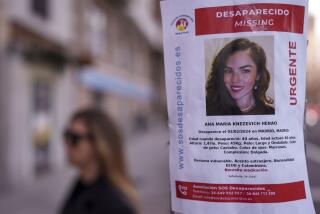Spy Case Prompts Woman to Sue Cuba for Sexual Assault
- Share via
MIAMI — They met in church, fell in love and married. And for 11 months they enjoyed a happy conjugal life.
But now, says Ana Margarita Martinez, every time that she and her husband made love, she was raped.
Not by her husband, Juan Pablo Roque.
By Cuba.
In a personal injury lawsuit filed here this week in state court, Martinez claims that the Republic of Cuba is guilty of sexually assaulting her because the man she wed was an agent of the government of Fidel Castro who used the marriage “as a mere pretext to carry out his spying mission for a terrorist state.”
In seeking unspecified monetary damages, the suit is believed to be the first ever to charge a sovereign nation with sexual battery. It also is a unique reflection of the myriad and bizarre ways in which Cuban exile politics seep into every corner of life in Miami.
“Although this seems a little laughable, it shows that, in love and war against the Castro government, anything goes,” said University of Miami sociologist Max Castro, a student of Cuban-American relations.
Little about the suit seems laughable to Martinez and her lawyers, however. “He fraudulently misrepresented his intentions, and you can’t give consent if you’re a victim of fraud,” said attorney Scott Leeds. “She has been devastated.”
Martinez said that if she had known Roque was a Cuban spy, she would not even have spoken to him, let alone married him.
Handsome and well-built, Roque swam to the U.S. Naval Base at Guantanamo Bay, Cuba, in 1992 and requested political asylum, saying he was a former air force major who had become disenchanted with Castro’s Communist regime. He met Martinez that same year, and they were married in 1995.
Attentive to Martinez’s two children from a previous marriage, Roque also was busy in the community, working as a personal trainer, founding an organization of ex-Cuban military officers and joining the exile group Brothers to the Rescue. With help from the Cuban-American National Foundation, he published an autobiography, “Deserter.”
And he picked up $6,700 as an informant for the FBI, providing information on exile groups and drug smugglers, agents later confirmed.
The day before two of the Brothers’ planes were shot down by Cuban MIGs in 1996, Roque mysteriously disappeared, telling his wife he was going to deliver a boat to Key West. Two days later he turned up on Cuban television, denouncing Brothers as a terrorist group and revealing himself as a double agent.
Martinez, 39, said she has been through months of therapy to get over the shock of her husband’s perfidy. “He was on a mission and part of it was establishing what seemed a normal relationship,” Martinez said. “Obviously there had to be some attraction to me. But not love. How can a person like that really love?”
As part of her recovery, Martinez had her marriage to Roque annulled and has written her own book, as yet unpublished, titled “Estrecho de Traicion (Strait of Betrayal).”
Roque’s exact role in the downing of the planes is unclear. But earlier this year, he was named as a defendant in a federal indictment against an alleged Cuban spy ring accused of a conspiracy to commit murder in the incident over the Straits of Florida. An outstanding warrant charges Roque with acting as a foreign agent without registering with the U.S. government.
Families of the four people killed when the Brothers planes were shot down also sued Cuba, and a federal judge in Miami awarded the survivors more than $187 million in damages. The money is to come from frozen Cuban assets but has not been paid.
Martinez is not counting on collecting any money. Rather, she said, “this is an opportunity to fight back. The moral victory is really what I’m focusing on.”
The bank secretary says that she still has not recovered from Roque’s betrayal. She well remembers her ex-husband’s reply when asked in Cuba what he missed most about his life in Miami: his 1994 Jeep Cherokee.
Researcher Anna M. Virtue contributed to this story.
More to Read
Sign up for Essential California
The most important California stories and recommendations in your inbox every morning.
You may occasionally receive promotional content from the Los Angeles Times.









